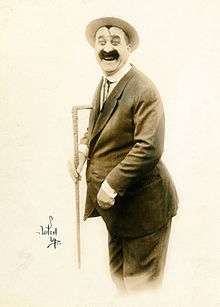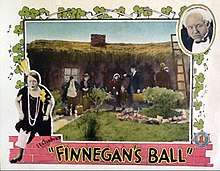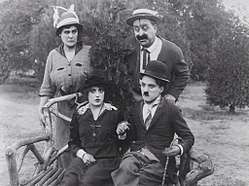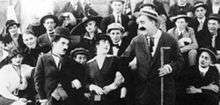Mack Swain
| Mack Swain | |
|---|---|
 In 1920, photo by Witzel. | |
| Born |
Moroni Swain February 16, 1876 Salt Lake City, Utah, USA |
| Died |
August 25, 1935 (aged 59) Tacoma, Washington, USA |
| Occupation | Actor, vaudevillian |
| Spouse(s) | Cora Claire King (1899-1935, his death) |
Mack Swain (born Moroni Swain,[1] February 16, 1876 – August 25, 1935) was an early American film actor, who appeared in many of Mack Sennett’s comedies at Keystone Studios, including the Keystone Cops series. He also appeared in major features by Charlie Chaplin.
Early years
Swain was born on February 16, 1876 to Robert Henry Swain and Mary Ingeborg Jensen in Salt Lake City, Utah and was educated in Salt Lake City's public schools. He ran away from home at age 15, joining a minstrel show. His mother took him home after one performance, but he persuaded her to let him continue in entertainment.[2]
Career
In the early 1900s, Swain had his own stock theater company, which performed in the western[3] and midwestern United States.[4]
Swain worked in vaudeville before starting in silent film at Keystone Studios under Mack Sennett. While with Keystone, he was teamed up with Chester Conklin to make a series of comedy films. With Swain as "Ambrose" and Conklin as the grand mustachioed "Walrus", they performed these roles in several films including The Battle of Ambrose and Walrus and Love, Speed and Thrills, both made in 1915.
Besides these comedies, the two appeared together in a variety of other films, 26 all told, and they also appeared separately and/or together in films starring Mabel Normand, Charles Chaplin, Roscoe Arbuckle and most of the rest of the roster of Keystone players.
Swain later took his Ambrose character with him to the L-KO Kompany. Having already worked with Charles Chaplin at Keystone, Swain began working with Chaplin again at First National in 1921, appearing in The Idle Class, Pay Day, and The Pilgrim. He is also remembered for his large supporting role as Big Jim McKay' in the 1925 film The Gold Rush,[1] for United Artists, written by and starring Chaplin.[5]
Personal life
Swain was married to actress Cora King.[6]
Death
Swain died in Tacoma, Washington on August 25, 1935 following an illness that only lasted a few hours.[5]
Legacy
For his contribution to the motion picture industry, Swain received a star on the Hollywood Walk of Fame, at 1500 Vine Street.[7]
Selected filmography

- Caught in the Rain (1914) as husband
- Tillie's Punctured Romance (1914) as John Banks
- Love, Speed and Thrills (1915)
- The Idle Class (1921)
- The Pilgrim (1923)
- The Gold Rush (1925) as Big Jim McKay
- Her Big Night (1926)
- Honesty – The Best Policy (1926)
- Whispering Wires (1926)
- My Best Girl (1927)
- Becky (1927)
- Gentlemen Prefer Blondes (1928)
- Tillie's Punctured Romance (1928)
- Mockery (1929)
- The Last Warning (1929)
Images
 Clockwise from top: Phyllis Allen, Mack Swain, Charles Chaplin and Mabel Normand in Getting Acquainted (1914)
Clockwise from top: Phyllis Allen, Mack Swain, Charles Chaplin and Mabel Normand in Getting Acquainted (1914) With Charles Chaplin and Mabel Normand in Gentlemen of Nerve (1914)
With Charles Chaplin and Mabel Normand in Gentlemen of Nerve (1914)
References
- 1 2 Hunter, James Michael (2013). Mormons and Popular Culture: The Global Influence of an American Phenomenon. ABC-CLIO. pp. 250–251. ISBN 9780313391675. Retrieved 15 May 2018.
- ↑ "Mack Swain, Colorful Film Comedian and Pioneer, Dies". The Salt Lake Tribune. Utah, Salt Lake City. Associated Press. August 27, 1935. p. 18. Retrieved May 14, 2018 – via Newspapers.com.

- ↑ "'The Little Minister'". Petaluma Daily Morning Courier. California, Petaluma. Napa Journal. February 18, 1907. p. 1. Retrieved May 14, 2018 – via Newspapers.com.

- ↑ "At the Opera House". The Alliance Herald. Nebraska, Alliance. October 14, 1904. p. 4. Retrieved May 14, 2018 – via Newspapers.com.

- 1 2 "Mack Swain Dead. Pioneer Film Actor. Appeared With Charlie Chaplin in Keystone Comedies Before Days of 'Stars'". New York Times. Associated Press. Retrieved 2015-03-09.
Mack Swain, stage and screen actor, died here late last night after a few hours' illness. He had suffered an internal hemorrhage in the afternoon. ...
- ↑ "Death Calls Mack Swain". The Los Angeles Times. California, Los Angeles. Associated Press. August 27, 1935. p. 3. Retrieved May 14, 2018 – via Newspapers.com.

- ↑ "Mack Swain". Hollywood Walk of Fame. Archived from the original on 15 May 2018. Retrieved 15 May 2018.
External links
![]()
- Mack Swain on IMDb